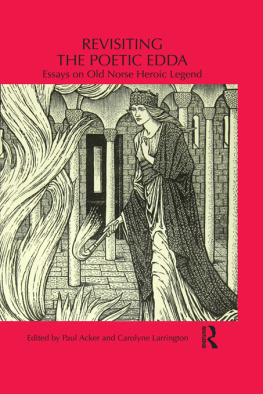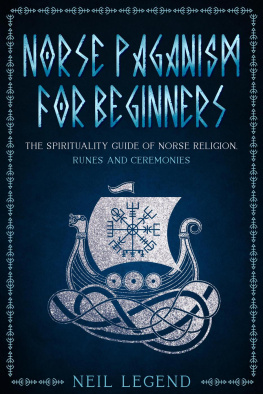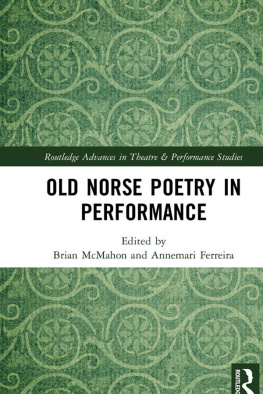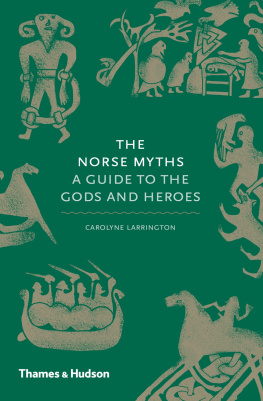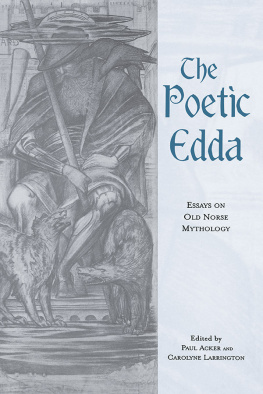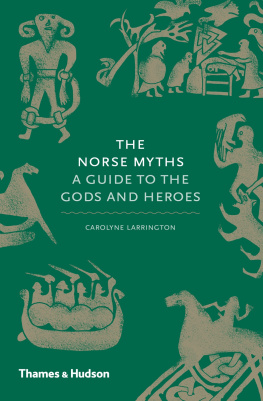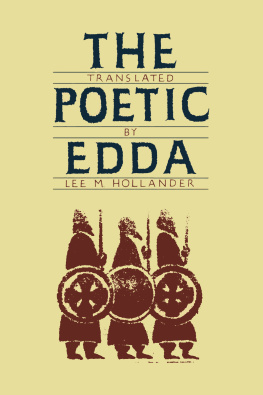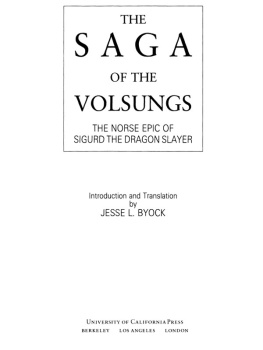Introduction
Revisiting the Poetic Edda
Paul Acker and Carolyne Larrington
A little less than midway through the principal manuscript of Eddic poetry, the Codex Regius (Reykjavk, AM GKS 2365 4to), on f. 20r of 45 surviving folios, the scribe marks a major division. Halfway down the page, the poem Alvssml ends with the line vppi ertv dvergr, vm dagar nv scn n sl i sali [the day has dawned upon you, dwarf; now sun shines into the hall]. The mighty god rr has vanquished his underworld antagonist Alvss, delaying him until dawn when the sun (we gather from other sources) turns him into stone, returning him to his proper element, for dwarfs live inside stones. The realm of the gods fills with sunlight. It is a fine ending for the collected mythological poems of the Poetic Edda, for that is what is happening on this manuscript page (reproduced as our frontispiece).
The scribe skips a line and begins a new poem with an oversized red capital letter A, five lines tall (it is the only time the scribe skips a whole line, and the initials for other poems have been a maximum of three lines tall).
It was into this world that the hero Helgi was born, whom the norns or Nordic fates declare will be the best and most famous of kings ( fylki frg-stan ok bulunga beztan ). Neither word used to describe him as king is the ordinary one, konungr ; rather, they are poetic words, for the best of kings deserves to have his name live on in heroic verse and so in memory. Thus it is said of Sigurr, the greatest hero in the Poetic Edda and in Germanic legend as a whole, that hans nafn mun aldri fyrnask verskri tungu ok Norurlndum, mean heimrinn stendr [his name will never be forgotten in the German tongue and in the northern lands, for as long as the world stands] ( Vlsunga saga ch. 34).
Sigurr is known as Ffnisbani , slayer of the dragon Ffnir, and so he is not only a great warrior and killer but specifically the killer of the greatest antagonist in Germanic legend, a dragon (see Acker, , for the specific nature of Eddic dragons). Similarly, Helgi is named Hundingsbani , slayer of his great (human) antagonist, the rival king Hundingr, who long had ruled over lands and thanes ( HHI st. 10). Helgi is not just a warrior but a leader of warriors; the word fylkir used to describe him means literally one who marshals the fylki or battle array (see La Farge 72). The first poem about Helgi is full of battles, with inns hounds (wolves) running ravenous on the field and valkyries riding like lightning in the sky overhead, their chain-mail stained with blood (the name of another great valkyrie, Brynhildr, means chain-mail-battle) and flashes of light coming from their spears ( HHI sts. 13 15). Helgi slays some sons of Hundingr, but another son, Lyngvi, survives for Sigurr to fight him; Lyngvi had earlier killed Sigmundr, father of both Helgi and Sigurr. There is a great battle; according to Vlsunga saga (ch. 17), Many a spear and many arrows could be seen hurtling through the air, the fierce sweep of the axe, cleft shields, gashed hauberks, helms slashed open, cleft skulls, and many a man was seen to fall to the ground (tr. Finch 29). The Eddic poem Reginsml (st. 26) tells us that Sigurr carved the blood eagle in Lyngvis back and reddened the earth with blood, giving pleasure to that other devourer of corpses, the raven. Accordingly, Sigurr, like Helgi, earns fame not just as a warrior but as a leader of warriors, the most magnificent of war-kings ( gfgastan herkonunga ; Fr daua Sinfjtla , last line).
More can and will be said in these pages about the nature of Eddic heroes. Tom Shippey has already commented in the Foreword about these heroes placing a high value on self-control. Edgar Haimerl () writes how Helgi Hundingsbani maintains homosocial bonds by the distribution of wealth (much as Beowulf does) and how his warriors assert their heroic masculinity through the exchange of insults. Helgi Hjrvarssonars men bond through competitive boasting; Helgi and his brother engage in sibling rivalry over a valkyrie bride (see also Larrington 2011).
Eddic heroines are equally if not more intriguing than their male counterparts. After the lacuna (see below), readers of the Codex Regius manuscript rejoin the story of Sigurr at a crisis point. The heroic confidence and courage with which the heroes Helgi and Sigurr faced their opponents and their interlocutors, the sunlight of Helgis youth, and his bold sea journeys over the tossing waves have dissipated into an uncertain ) reads Brynhildr and the other women in the heroic poetry, in terms of speech act theory; she argues that women use words as weapons to achieve their aims; although some speech acts fail, others are extremely successful. While Gurns frozen grief melts into tears and her formal lament for her dead husband releases her emotions, Brynhildr is giving orders for the construction of her funeral pyre, ordering hounds, hawks, and servants to be company for her on the road to Hel, where she will be united with Sigurr. In these poems, the focus is on female feelings and womens speech: rage, wild exultation, and profound sorrow occupy the poets imagination.
Sigurrs widow Gurn metamorphoses from the traumatized and grieving woman discussed by Svborg () into a terrifying, even monstrous, wife and mother. In Gurnarkvia II and III and Oddrnargrtr , womens emotion subsides into quieter recollection of the many sorrows that these women have to face. Gurn must make peace with her brothers and offer herself up once again in the exchange of women process; despite her prophetic misgivings, she is married off to Brynhildrs brotherfor the Gjkungs owe him a woman after letting his sister die (see Quinn 2009). Atlis court is a place of sorrow; moreover, Brynhildrs sister, the one whom Gunnarr should have married, utters, in solidarity with her dying friend, Borghildr, a tregrf [chain of woes], lamenting her tragic fate. Oddrns brother Atli has foreclosed her bid to bring the strife between the two houses to an end.
Gurn cannot save her brothers from Atli. When her husband breaks all his oaths and murders her brothers in the quest to gain the treasure Sigurr won from Ffnir, Gurn sacrifices her children and feeds their flesh to her husband, making sure he knows the full horror of what he has done before she finally kills him. Carolyne Larrington (Hamir and Srli, ride furiously off on a mission of revenge, which they regard as hopeless, their mother seems finally set to emulate Brynhildr, who invited her to join her on Sigurrs funeral pyre so many years before, and she anticipates her passionate reunion with her first husband: Beittu, Sigurr, inn blacca mar, / hest in hrafra, lttu hinig renna! [Bridle, Sigurr, the dark-coloured shining horse, / the swift-footed charger, let it gallop here!] ( Ghv sts. 18/23). Sigurr will be waiting for her as she finally ascends the blazing pyre and brings her tragedy to an end.
Womens mourning, and its concomitant action, vengeance, inform these final poems. The elegiac mode is foregrounded, its minor key only intermittently reverting to the bolder pace of the heroic: Gunnarr and Hgni galloping in fury to Atlis court, or rowing so mightily across the fjord to his farm-stead that the rowlocks split. Hamir and Srli imitate their uncles in their rage-filled ride to avenge their sister, yet, fatally, they pause to strike down their half-brother whose riddling words challenge their sense of who is truly part of the family. Brynhildr rages and laughs; even on the road to Hel, she vindicates the choices she has made when challenged by the ggr giantess, who bars her way, while Gurn moves from sobbing innocent to dry-eyed murderess, from prophetic pawn in the patriarchal game of exchange to steely actor on her own account.
The last heroines of the heroic world are, unexpectedly perhaps, the enslaved giantesses Fenja and Menja whose captor, the merciless Fri, orders them to grind and grind at the magical mill-stone Grotti, grinding out gold and good fortune. But as Frois intransigence is countered by the slow-building rage of the giant women Fenja and Menja, who fatefully grind out annihilation for him, the mill-stone shatters. Judy Quinn () offers a new ecological reading of Grottasngr , showing how the appropriation and misuse of a natural resource that belongs to the domain of the giants causes the downfall of a king. Women here have the final word, patrolling the ways in which human kings can behave.

